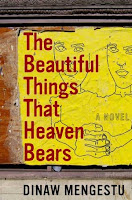If you had asked me last year what my favorite bookmark was, the answer would have been easy: my Phoenix Suns bookmark circa 1994 from the Charles Barkley era of the Suns. I mean, the bookmark had Dan Majerle AND the Phoenix Suns gorilla, so how could it have not been my favorite? Used to mark my page in many a book, I had to retire the beloved place holder many years ago as it started to deteriorate, but without a doubt it remained my favorite because of sentimentally attached.
If you ask me now what my favorite bookmark is, I would have no choice but to tell you my favorite bookmark has changed, thanks to a gift I got from a dear friend. These bookmarks are adorable. They are little green silicone rubber sprouts that shoot out of the top of the book. Here is a shot of the bookmark in action.
If you ask me now what my favorite bookmark is, I would have no choice but to tell you my favorite bookmark has changed, thanks to a gift I got from a dear friend. These bookmarks are adorable. They are little green silicone rubber sprouts that shoot out of the top of the book. Here is a shot of the bookmark in action.
How cute is that? The sprout bookmarks are from Fred & Friends. They come in a pack of six, so no worries if you read multiple books at a time and need a marker for each. Another bonus is that they are synthetic, and so I'll never have to worry about the wear and tear of a paper bookmark. They also give a little touch of nature to your book, which just makes me happy.
In sum, if you are looking for a gift for a bookworm friend, or if you are in the market for some sturdy bookmarks to replace the random things you're using to mark your place now (I am guilty of using hair ties, receipts, even a Kleenex from time to time), then I would recommend these, my new favorite bookmarks, naturally.








